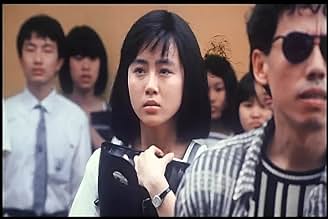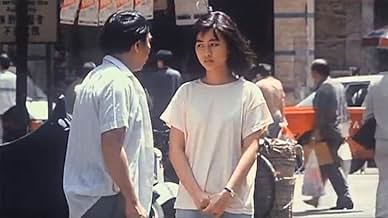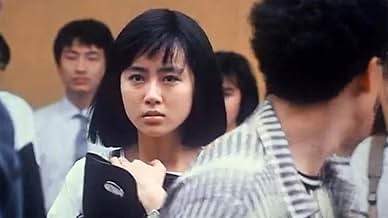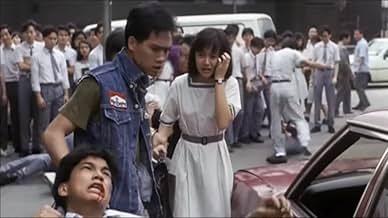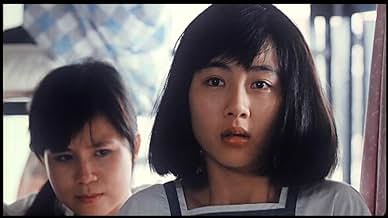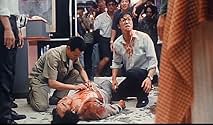Ajouter une intrigue dans votre langueA young schoolgirl gets involved in the triads of Hong Kong after a classmate is killed in a fight.A young schoolgirl gets involved in the triads of Hong Kong after a classmate is killed in a fight.A young schoolgirl gets involved in the triads of Hong Kong after a classmate is killed in a fight.
- Director
- Writer
- Stars
- Prix
- 1 victoire au total
Lai-Yui Lee
- Kwok Siu-Chun
- (as Sarah Lee)
Histoire
Le saviez-vous
- AnecdotesA small part of the dialogue from a scene was used in the song "Uk Chuen Jai" performed by a Hong Kong hip hop group, LMF. Song lyrics are about the life of a local street gangster.
- Autres versionsThe Tai Seng Video, which was dubbed in Mandarin, pan and scan so you can't really read the subtitles, freeze-frames for about 2 seconds at the end, when Roy Cheung (Brother Smart) falls to his death.
Commentaire en vedette
Hong Kong director Ringo Lam's (CITY ON FIRE, PRISON ON FIRE 1 and 2, BURNING PARADISE etc.) earlier film SCHOOL ON FIRE (1988) is a very harrowing and bleak film that ranks very high in the list of Lam's often masterful films, which are usually darker, grittier and more violent than other Hong Kong action and crime films, and thus the admirers of the "beautiful Woo cinema" may not like him as much. But Lam is no less talented or noteworthy director and it was finally proved in his 1992 miracle, FULL CONTACT, starring Simon Yam, Chow Yun-Fat and Anthony Wong.
SCHOOL ON FIRE begins with a violent murder committed by some school children/teenagers after a fist fight and chase. It soon turns out that the school is inhabited and terrorized by a bunch of (young) triad gangsters who try to seduce teenagers to join them and to begin a criminal life rather than studying and becoming a potentially good citizen. One girl witnesses the murder and from that on, the life of hers and people close to her start to go straight to hell as the triad members don't want her to testify against them in the court. The film ends in an incredibly fierce bloodbath and the viewer is left in pure disgust towards the film gangsters' ideals and attitudes which led to the horrible conclusion, and that was Lam's intention with this film, and NOT just to make a cheap ultra violent "exploitation film" as one writer in his magazine has suggested.
The film has a great and talented cast which includes younger faces like Roy Cheung as a triad lord, Fennie Yuen as an innocent school girl and the great late Ching-Ying Lam who's remembered from his performances in the masterful MR. VAMPIRE films plus many others, and in SCHOOL he plays a cop trying to remain good and unwilling to use violence. The actors don't overact albeit the script does so at times. The young triads are portrayed believably and they will too see what kind of things their violence results.
The atmosphere is very dark, brutal, bleak and violent. The film has as pessimistic ending as one could expect in an independent and honest film like this. The strong images and scenes are taken even further by the stunning soundtrack by Lowell Lo, who was also responsible for the soundtrack in John Woo's THE KILLER. Especially the usage of music is at its most powerful when the protagonist girl decides to do the saddest thing in her life at the middle part of the film. I can only wonder how effective this film could be in a big screen. Also after the final bloodbath the images shown before the end credits are really haunting and the importance of music in that scene is again remarkable.
This film depicts our attitudes towards violence and revenge and how rotten these attitudes are and what really can be achieved by using violence after all. There are characters who try to remain pure and "good" but most of them turn evil before the end credits, and that is also why the finale is so harrowing to experience. The film is ultra violent and ugly and never glorifies its violence no matter how graphic it gets; it just shows how it is in real life, too, and that is the only honest way to depict violence in Cinema. If a film is violent, that doesn't mean it's exploitation or just low garbage; it is about HOW the violence is handled and shown and what the film maker wants to say with it. In this film, Lam and his screenwriter brother Nam Yin wanted to say things that concern everyone on earth, and maybe that's why so few seem to understand this film and others of its kind.
The film depicts school children a lot and the name involves word "school" which indicates to youngsters, but the message concerns human nature in general as children are of course blossoming and developing human beings who build their world view according to what they experience, what ideals and attitudes they see and in what kind of an environment they grow up and live. Cinema is a great tool for its artists to affect people's attitudes and try to change the world into better place, and films like SCHOOL ON FIRE really becomes even more important after thinking about that. That is also why the huge cuts demanded to this film before its release feel very wrong and unjustified.
The negative things in the film are about the screenplay which has some little irritating bits of dialogue by the characters as they scream little comically various things (like "I don't want to study!!" several times etc.) in their misery. The dialogue should have been little more restrained and carefully written, but fortunately these little flaws are not too plenty and don't affect too harmfully to the film as a whole. And as said, this film totally lacks any humor attempts and other things which usually make Hong Kong films look brainless and very trashy. There is no humor nor slapstick in SCHOOL ON FIRE. I don't think there are even too many smiles in the film neither!
This is among the true masterpieces of Ringo Lam and it is unbearably sad how much this film suffered before getting its release. Over 30 cuts were demanded and I think the removed footage doesn't even exits anymore (as is the case with Herman Yau's EBOLA SYNDROME), so it is likely we don't ever get to see the director's original vision and how outstanding that would have been. The current HK VCD release of SCHOOL ON FIRE has a very irritating "freeze frame cut" at the end which makes the cut(s) as noticeable as possible. The rest of the film doesn't suffer as much as it could in the worst case and fortunately there aren't other too visible cuts or jumps in the soundtrack, but a lot is still missing.
SCHOOL ON FIRE gets 8/10 from me and this is one of the most powerful and darkest films I've seen for some time. Ringo is a master.
SCHOOL ON FIRE begins with a violent murder committed by some school children/teenagers after a fist fight and chase. It soon turns out that the school is inhabited and terrorized by a bunch of (young) triad gangsters who try to seduce teenagers to join them and to begin a criminal life rather than studying and becoming a potentially good citizen. One girl witnesses the murder and from that on, the life of hers and people close to her start to go straight to hell as the triad members don't want her to testify against them in the court. The film ends in an incredibly fierce bloodbath and the viewer is left in pure disgust towards the film gangsters' ideals and attitudes which led to the horrible conclusion, and that was Lam's intention with this film, and NOT just to make a cheap ultra violent "exploitation film" as one writer in his magazine has suggested.
The film has a great and talented cast which includes younger faces like Roy Cheung as a triad lord, Fennie Yuen as an innocent school girl and the great late Ching-Ying Lam who's remembered from his performances in the masterful MR. VAMPIRE films plus many others, and in SCHOOL he plays a cop trying to remain good and unwilling to use violence. The actors don't overact albeit the script does so at times. The young triads are portrayed believably and they will too see what kind of things their violence results.
The atmosphere is very dark, brutal, bleak and violent. The film has as pessimistic ending as one could expect in an independent and honest film like this. The strong images and scenes are taken even further by the stunning soundtrack by Lowell Lo, who was also responsible for the soundtrack in John Woo's THE KILLER. Especially the usage of music is at its most powerful when the protagonist girl decides to do the saddest thing in her life at the middle part of the film. I can only wonder how effective this film could be in a big screen. Also after the final bloodbath the images shown before the end credits are really haunting and the importance of music in that scene is again remarkable.
This film depicts our attitudes towards violence and revenge and how rotten these attitudes are and what really can be achieved by using violence after all. There are characters who try to remain pure and "good" but most of them turn evil before the end credits, and that is also why the finale is so harrowing to experience. The film is ultra violent and ugly and never glorifies its violence no matter how graphic it gets; it just shows how it is in real life, too, and that is the only honest way to depict violence in Cinema. If a film is violent, that doesn't mean it's exploitation or just low garbage; it is about HOW the violence is handled and shown and what the film maker wants to say with it. In this film, Lam and his screenwriter brother Nam Yin wanted to say things that concern everyone on earth, and maybe that's why so few seem to understand this film and others of its kind.
The film depicts school children a lot and the name involves word "school" which indicates to youngsters, but the message concerns human nature in general as children are of course blossoming and developing human beings who build their world view according to what they experience, what ideals and attitudes they see and in what kind of an environment they grow up and live. Cinema is a great tool for its artists to affect people's attitudes and try to change the world into better place, and films like SCHOOL ON FIRE really becomes even more important after thinking about that. That is also why the huge cuts demanded to this film before its release feel very wrong and unjustified.
The negative things in the film are about the screenplay which has some little irritating bits of dialogue by the characters as they scream little comically various things (like "I don't want to study!!" several times etc.) in their misery. The dialogue should have been little more restrained and carefully written, but fortunately these little flaws are not too plenty and don't affect too harmfully to the film as a whole. And as said, this film totally lacks any humor attempts and other things which usually make Hong Kong films look brainless and very trashy. There is no humor nor slapstick in SCHOOL ON FIRE. I don't think there are even too many smiles in the film neither!
This is among the true masterpieces of Ringo Lam and it is unbearably sad how much this film suffered before getting its release. Over 30 cuts were demanded and I think the removed footage doesn't even exits anymore (as is the case with Herman Yau's EBOLA SYNDROME), so it is likely we don't ever get to see the director's original vision and how outstanding that would have been. The current HK VCD release of SCHOOL ON FIRE has a very irritating "freeze frame cut" at the end which makes the cut(s) as noticeable as possible. The rest of the film doesn't suffer as much as it could in the worst case and fortunately there aren't other too visible cuts or jumps in the soundtrack, but a lot is still missing.
SCHOOL ON FIRE gets 8/10 from me and this is one of the most powerful and darkest films I've seen for some time. Ringo is a master.
- Bogey Man
- 6 nov. 2002
- Lien permanent
Meilleurs choix
Connectez-vous pour évaluer et surveiller les recommandations personnalisées
- How long is School on Fire?Propulsé par Alexa
Détails
- Date de sortie
- Pays d’origine
- Langue
- Aussi connu sous le nom de
- School on Fire
- société de production
- Consultez plus de crédits d'entreprise sur IMDbPro
Contribuer à cette page
Suggérer une modification ou ajouter du contenu manquant

Lacune principale
By what name was Hok hau fung wan (1988) officially released in Canada in English?
Répondre
